六年级英语下册 Unit 1 Lesson 6 How was your holiday教案 人教新版
人教(新版)英语六下UNIT1howwasyourholiday(lesson1)
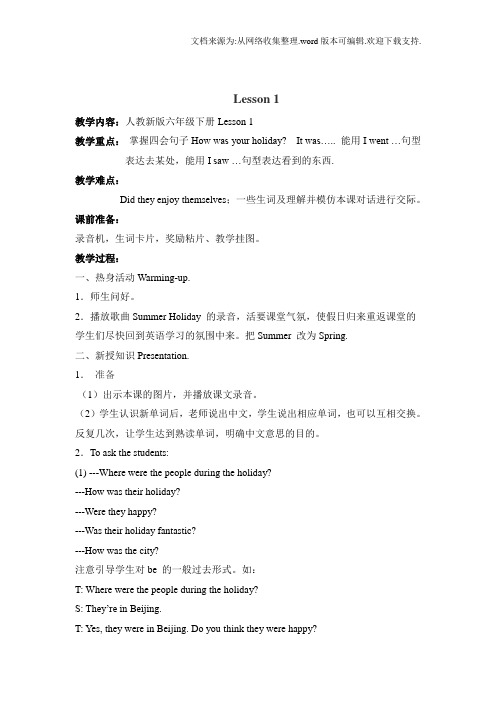
Lesson 1教学内容:人教新版六年级下册Lesson 1教学重点:掌握四会句子How was your holiday? It was….. 能用I went …句型表达去某处,能用I saw …句型表达看到的东西.教学难点:Did they enjoy themselves;一些生词及理解并模仿本课对话进行交际。
课前准备:录音机,生词卡片,奖励粘片、教学挂图。
教学过程:一、热身活动Warming-up.1.师生问好。
2.播放歌曲Summer Holiday 的录音,活要课堂气氛,使假日归来重返课堂的学生们尽快回到英语学习的氛围中来。
把Summer 改为Spring.二、新授知识Presentation.1.准备(1)出示本课的图片,并播放课文录音。
(2)学生认识新单词后,老师说出中文,学生说出相应单词,也可以互相交换。
反复几次,让学生达到熟读单词,明确中文意思的目的。
2.To ask the students:(1) ---Where were the people during the holiday?---How was their holiday?---Were they happy?---Was their holiday fantastic?---How was the city?注意引导学生对be 的一般过去形式。
如:T: Where were the people during the holiday?S: They’re in Beijing.T: Yes, they were in Beijing. Do you think they were happy?S: I think they are happy?T: They were in Beijing. So they were happy.Was their holiday fantastic?S: Their holiday is happy!T: We say was, not is. We say were ,not are.3.明确地展示出be动词的一般过去形式:Was is/amwere areTime line ---------------------------------------------------Past now4.播放录音磁带,并且展示间笔画,以帮助学生理解对话内容。
六年级英语下册-Unit-1-Lesson-1课件-人教新版

It during holiday?
I was in the Terracotta Warriors Xi’an.
How was your holiday?
It was fantastic.
Where were you during holiday?
How was your holiday?
It was interesting.
Where were you during holiday?
I was in Guilin Guangxi.
How was your holiday?
It was fantastic.
Where were you during holiday?
Where were you during holiday?
I was at home.
How was your holiday?
It was exciting.
Where were you during holiday?
I was in Shanghai.
How was your holiday?
I was in Dunhung Grotto. How was your holiday?
It was fantastic.
Where were you during holiday?
I was Rime Jilin.
How was your holiday?
It exciting.
Where was Kate during her holiday?
It was wonderful.
Where were you during holiday?
I was in Beijing.
最新-六年级英语下册 Unit1 lesson2 How was your holidayLesson教案 人教新版 精品
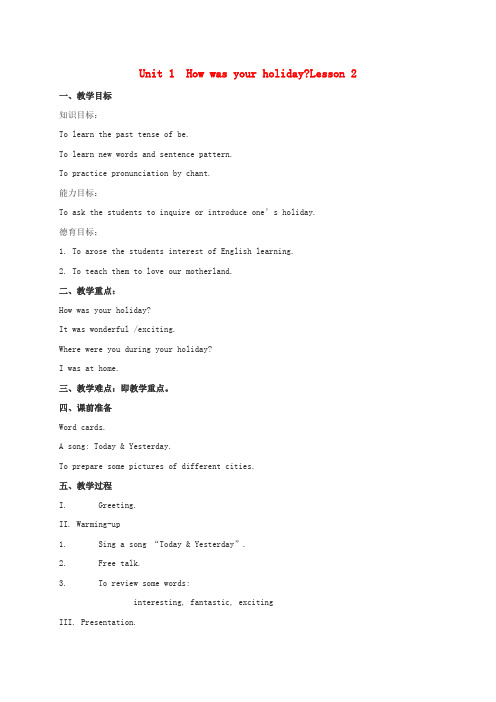
Unit 1 How was your holiday?Lesson 2 一、教学目标知识目标:To learn the past tense of be.To learn new words and sentence pattern.To practice pronunciation by chant.能力目标:To ask the students to inquire or introduce one’s holiday.德育目标;1. To arose the students interest of English learning.2. To teach them to love our motherland.二、教学重点:How was your holiday?It was wonderful /exciting.Where were you during your holiday?I was at home.三、教学难点:即教学重点。
四、课前准备Word cards.A song: Today & Yesterday.To prepare some pictures of different cities.五、教学过程I. Greeting.II. Warming-up1. Sing a song “Today & Yesterday”.2. Free talk.3. To review some words:interesting, fantastic, excitingIII. Presentation.1. To teach them the new words: wonderful, exciting.2. To have a competition: Who can read it faster?(interesting, fantastic, exciting, wonderful)3. To learn the new sentence pattern:How was your holiday?It was wonderful.Where were you during your holiday?I was at home.IV. Practice1. To look at the words and pictures on the screen and ask the students to practice the new sentence pattern.2. Chant.3. To make up new dialogues according to the new sentence pattern (with their own photos or the pictures).4. Time to sing. (Happy song) V. Summary六、教学意图I. Greeting.II. Warming-up1. To review the words: was, were.2. To review the knowledge they’ve learned before.III. Presentation.1. To teach them the new words.2. The students master the new words.3. To learn the new sentence pattern.IV. Practice1. To master the new words and sentence pattern.2. To practice pronunciation.3. The students can use the new sentence pattern and new words freely by making up new dialogues.V. Summary七、作业1. To write the new words and sentences.2. To make up new dialogues according to the new sentence pattern.板书设计:Lesson2How was your holiday?It was wonderful /exciting.Where were you during your holiday?I was at home.。
人教精通六年级下册unit 1Lesson 6

A.her
B. herself
C. hers
5.We often worked_B__ pairs.
A. on
B.in
5.翻译 1.我妈妈总是让我自己的事情自己做。 My mother always let me do things by myself. 2.Let me tell you about my stories. 让我告诉你关于我的故事。 3.did, tasks, we, interesting(.) We did interesting tasks.
让我告诉你我们怎样学习英语。
2.Three years ago we began to learn English.
三年以前,我们开始学英语。
3.Our English teacher taught us in many ways. teach过去式 taught way 方式 in many ways 用许多方式
1.I have learned a lot of w_o_r_d_s___. 2.We always l_e_a_r_n_ from each other. 3.They A____ good students.
A. are all B. all are C. both are
4.Lisa often does her homework by B____.
4.Our teacher usually let us do things by ourselves.我们的老师让我们自己多 事情。
let +人+do…让某人做什么
My friend let me play with her. by ourselves 我们自己 by myself 我自己
六年级下册英语课件-Unit1 .(Lesson6) |人教精通版

What did you do on your holidays? I went to Sanya.
What did you do during holidays?
I stayed at home during holidays.
New words
P.E
music
Chinese
math
subject 学科
-How did you learn English? -We learned English by having an English party.
-How did you learn English? -We learned English by acting in drama.
We learned from each other. 我们互相学习。
当堂训练
Show time. 要求:小组内采用自己喜欢的方 式读课文两遍(齐读,领读,分 角色读,自己读),然后上台展 示。
Homework(作业) 1.单词写5遍,意思写1遍。 2.句子抄2遍,图片短语照红色字体句子仿 写写一遍。
3.小组练习对话,回家对父母讲述。
自我反思
比一比这节课 谁的收获更多 呢?
books.
__re_a_d_i_n_g__
from
2.We often learn of each other.______
3.My brother stay in a hotel during his holidays.__s_ta_y_e_d_
4.We had anEnglish party last week.___
-How did you learn English? -We learned English by learning from each other.
六年级英语下册Unit 1笔记
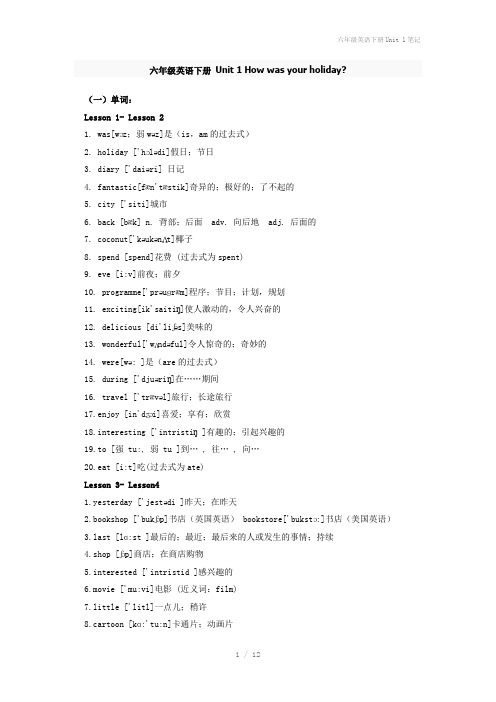
六年级英语下册Unit 1 How was your holiday?(一)单词:Lesson 1- Lesson 21. was[wɔz;弱wəz]是(is,am的过去式)2. holiday ['hɔlədi]假日;节日3. diary ['daiəri] 日记4. fantastic[fæn'tæstik]奇异的;极好的;了不起的5. city ['siti]城市6. back [bæk] n. 背部;后面 adv. 向后地 adj. 后面的7. coconut['kəukənʌt]椰子8. spend [spend]花费 (过去式为spent)9. eve [i:v]前夜;前夕10. programme['prəuɡræm]程序;节目;计划,规划11. exciting[ik'saitiŋ]使人激动的,令人兴奋的12. delicious [di'liʃəs]美味的13. wonderful['wʌndəful]令人惊奇的;奇妙的14. were[wə: ]是(are的过去式)15. during ['djuəriŋ]在……期间16. travel ['trævəl]旅行;长途旅行17.enjoy [in'dʒɔi]喜爱;享有;欣赏18.interesting ['intristiŋ ]有趣的;引起兴趣的19.to [强 tu:, 弱 tu ]到… , 往… , 向…20.eat [i:t]吃(过去式为ate)Lesson 3- Lesson41.yesterday ['jestədi ]昨天;在昨天2.bookshop ['bukʃɔp]书店(英国英语) bookstore['bukstɔ:]书店(美国英语)st [lɑ:st ]最后的;最近;最后来的人或发生的事情;持续4.shop [ʃɔp]商店;在商店购物5.interested ['intristid ]感兴趣的6.movie ['mu:vi]电影 (近义词:film)7.little ['litl]一点儿;稍许8.cartoon [kɑ:'tu:n]卡通片;动画片9.call [kɔ:l] 打电话叫… ; 称呼;把…叫做10.about [ə'baut]大约,左右;关于,对于11. museum[mju:'ziəm]博物馆12.home[həum]在家;到家13.time [taim]时间(不可数名词);次数(可数名词);倍数(可数名词)14.buy [bai]买(过去式为bought)Lesson 5- Lesson61.born [bɔ:n]出生;天生(在某方面才能)的2.when[hwen]在那时;何时;当……时3.age [eidʒ]年龄4.date [deit]日期;日子;约会;约见5.birth [bə:θ]出生;诞生;分娩6.place [pleis]地点;位置;场所;区域;席位;名词7.same [seim]同样的;同一的;相同的8.as [æz]conj. 因为;依照;当…时;随着;虽然prep. 当作;以…的身份;如同adv.同样地;和…一样的9.ill [il]有病的;不健康的同义词:sick 比较级:worse 最高级:worst10.Einstein 爱因斯坦(Albert Einstein)11.Andersen 安徒生 (Hans Christian Anderson,丹麦的童话作家)12.grandma['ɡrændmɑ:]奶奶;外婆13.physics['fiziks]物理学14.essay['esei]散文;随笔Revision( Unit One )1.library ['laibrəri]图书馆;藏书楼2.spot[spɔt]点;斑点;看见(到);注意到;辨认;发现3.gym[dʒim]体育馆4.over ['əuvə]结束;在…上方(面)(指垂直的上方)5.toilet ['tɔilit]厕所;卫生间6.angry ['æŋɡri]生气的;发怒的7.care [kεə]小心;谨慎;关心;照顾8.suddenly['sʌdnl i]突然地六年级英语下册 Unit 1 How was your holiday?(二)词组:Lesson 1- Lesson 21. come back to 返回2. enjoy oneself=have a good time = have fun 过得愉快3. many banana trees 许多香蕉树4. go there 去那儿5. in summer 在夏季6. on the eve of the Spring Festival 在春节前夜7. that night 那天晚上8. during your holiday 在你的假期期间9. in Shanghai ( Kunming) 在上海(昆明)Lesson 3- Lesson41. at home 在家;在国内 be at home in 精通;熟悉2.at the bookshop在书店3.at the shop 在商店4.at the cinema 在电影院5.a lot of new books 许多新书6.a book of cartoon 一本卡通书7.see a movie 看电影8. a little late 有点儿晚9.be interested in doing sth.对做某事感兴趣10.enjoy doing sth.喜爱做某事st Sunday上周日12.at that time在那时13.in the playground ( gym )在操场上(体育馆)14.go to bed 上床睡觉;go to the bed 向床走去Lesson 5- Lesson61.on the same day as you与你在同一天2.on New Year’s Day在新年3.on January 1st,1992 在1992年1月1日st week 上周5.date of birth=birthdate出生日期6. place of birth =birthplace出生地7.study physics 研究物理学8.write stories for children为孩子们写故事9.write essays for the Chinese people为中国人写文章10.write books for children为孩子们写书11.cry to me 向我哭泣Revision( Unit One )1.take care of 照顾;负责2.spot something 发现了一些东西3.get home 到家4.this morning (afternoon )今天早上(下午)5.in the library 在图书馆6.be angry with sb. 对…生气六年级英语下册 Unit 1 How was your holiday?(三)句型:Lesson 11.School begins. The sudents come back to school.开学了。
小学英语六年级练习册翻译(Unit1、2、5)
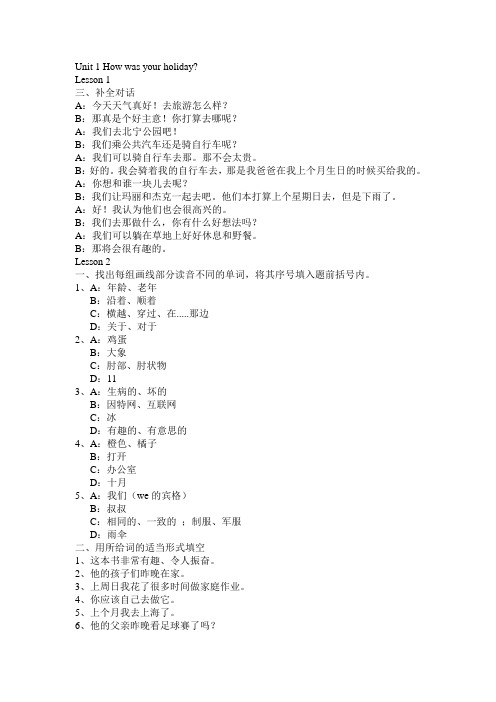
Unit 1 How was your holiday?Lesson 1三、补全对话A:今天天气真好!去旅游怎么样?B:那真是个好主意!你打算去哪呢?A:我们去北宁公园吧!B:我们乘公共汽车还是骑自行车呢?A:我们可以骑自行车去那。
那不会太贵。
B:好的。
我会骑着我的自行车去,那是我爸爸在我上个月生日的时候买给我的。
A:你想和谁一块儿去呢?B:我们让玛丽和杰克一起去吧。
他们本打算上个星期日去,但是下雨了。
A:好!我认为他们也会很高兴的。
B:我们去那做什么,你有什么好想法吗?A:我们可以躺在草地上好好休息和野餐。
B:那将会很有趣的。
Lesson 2一、找出每组画线部分读音不同的单词,将其序号填入题前括号内。
1、A:年龄、老年B:沿着、顺着C:横越、穿过、在.....那边D:关于、对于2、A:鸡蛋B:大象C:肘部、肘状物D:113、A:生病的、坏的B:因特网、互联网C:冰D:有趣的、有意思的4、A:橙色、橘子B:打开C:办公室D:十月5、A:我们(we的宾格)B:叔叔C:相同的、一致的;制服、军服D:雨伞二、用所给词的适当形式填空1、这本书非常有趣、令人振奋。
2、他的孩子们昨晚在家。
3、上周日我花了很多时间做家庭作业。
4、你应该自己去做它。
5、上个月我去上海了。
6、他的父亲昨晚看足球赛了吗?7、我昨天没有忘记关灯。
8、这个夏天我去天津博物馆了。
9、昨天晚上,我见到我的老师了。
10、昨天的阅读还愉快么?三、1、孩子们在圣诞节前夕玩得很愉快。
2、布朗先生喜欢住在第八层楼。
3、我昨晚太兴奋了,以至于睡不着。
4、你看起来很累,为什么不停下来休息一会呢?5、他们在星期二早上有一个会议。
四、1、放假期间我呆在家里。
2、我们的假期棒极了。
3、我玩得很高兴。
4、你的哥哥每天下午都打篮球吗?5、三亚是一个美丽的城市。
Lesson 3一、1、去、离去2、扮演、充当、行动、表演3、发送、寄出4、看、看见5、学习、研究6、询问、要求、请求7、带去、拿、取8、获得、到达、取出9、做、制造、获得10、有、拥有、吃、喝11、吃12、开始二、1、我妈妈给我买了一双新鞋子。
小学英语六年级练习册翻译(Unit1、2、5)(2)
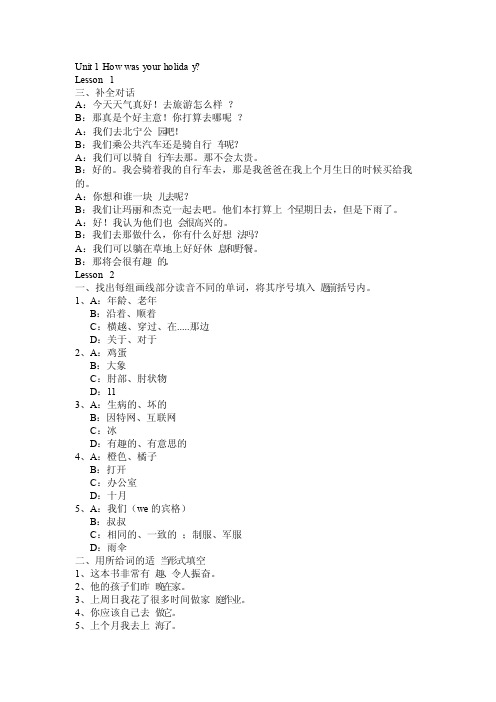
Unit 1 How was your holiday?Lesson1三、补全对话A:今天天气真好!去旅游怎么样?B:那真是个好主意!你打算去哪呢?A:我们去北宁公园吧!B:我们乘公共汽车还是骑自行车呢?A:我们可以骑自行车去那。
那不会太贵。
B:好的。
我会骑着我的自行车去,那是我爸爸在我上个月生日的时候买给我的。
A:你想和谁一块儿去呢?B:我们让玛丽和杰克一起去吧。
他们本打算上个星期日去,但是下雨了。
A:好!我认为他们也会很高兴的。
B:我们去那做什么,你有什么好想法吗?A:我们可以躺在草地上好好休息和野餐。
B:那将会很有趣的。
Lesson2一、找出每组画线部分读音不同的单词,将其序号填入题前括号内。
1、A:年龄、老年B:沿着、顺着C:横越、穿过、在.....那边D:关于、对于2、A:鸡蛋B:大象C:肘部、肘状物D:113、A:生病的、坏的B:因特网、互联网C:冰D:有趣的、有意思的4、A:橙色、橘子B:打开C:办公室D:十月5、A:我们(we的宾格)B:叔叔C:相同的、一致的;制服、军服D:雨伞二、用所给词的适当形式填空1、这本书非常有趣、令人振奋。
2、他的孩子们昨晚在家。
3、上周日我花了很多时间做家庭作业。
4、你应该自己去做它。
5、上个月我去上海了。
6、他的父亲昨晚看足球赛了吗?7、我昨天没有忘记关灯。
8、这个夏天我去天津博物馆了。
9、昨天晚上,我见到我的老师了。
10、昨天的阅读还愉快么?三、1、孩子们在圣诞节前夕玩得很愉快。
2、布朗先生喜欢住在第八层楼。
3、我昨晚太兴奋了,以至于睡不着。
4、你看起来很累,为什么不停下来休息一会呢?5、他们在星期二早上有一个会议。
四、1、放假期间我呆在家里。
2、我们的假期棒极了。
3、我玩得很高兴。
4、你的哥哥每天下午都打篮球吗?5、三亚是一个美丽的城市。
小学英语六年级练习册翻译(Unit1、2、5)

Unit 1 How was your holiday?Lesson 1三、补全对话A:今天天气真好!去旅游怎么样?B:那真是个好主意!你打算去哪呢?A:我们去北宁公园吧!B:我们乘公共汽车还是骑自行车呢?A:我们可以骑自行车去那。
那不会太贵。
B:好的。
我会骑着我的自行车去,那是我爸爸在我上个月生日的时候买给我的。
A:你想和谁一块儿去呢?B:我们让玛丽和杰克一起去吧。
他们本打算上个星期日去,但是下雨了。
A:好!我认为他们也会很高兴的。
B:我们去那做什么,你有什么好想法吗?A:我们可以躺在草地上好好休息和野餐。
B:那将会很有趣的。
Lesson 2一、找出每组画线部分读音不同的单词,将其序号填入题前括号内。
1、A:年龄、老年B:沿着、顺着C:横越、穿过、在.....那边D:关于、对于2、A:鸡蛋B:大象C:肘部、肘状物D:113、A:生病的、坏的B:因特网、互联网C:冰D:有趣的、有意思的4、A:橙色、橘子B:打开C:办公室D:十月5、A:我们(we的宾格)B:叔叔C:相同的、一致的;制服、军服D:雨伞二、用所给词的适当形式填空1、这本书非常有趣、令人振奋。
2、他的孩子们昨晚在家。
3、上周日我花了很多时间做家庭作业。
4、你应该自己去做它。
5、上个月我去上海了。
6、他的父亲昨晚看足球赛了吗?7、我昨天没有忘记关灯。
8、这个夏天我去天津博物馆了。
9、昨天晚上,我见到我的老师了。
10、昨天的阅读还愉快么?三、1、孩子们在圣诞节前夕玩得很愉快。
2、布朗先生喜欢住在第八层楼。
3、我昨晚太兴奋了,以至于睡不着。
4、你看起来很累,为什么不停下来休息一会呢?5、他们在星期二早上有一个会议。
四、1、放假期间我呆在家里。
2、我们的假期棒极了。
3、我玩得很高兴。
4、你的哥哥每天下午都打篮球吗?5、三亚是一个美丽的城市。
Lesson 3一、1、去、离去2、扮演、充当、行动、表演3、发送、寄出4、看、看见5、学习、研究6、询问、要求、请求7、带去、拿、取8、获得、到达、取出9、做、制造、获得10、有、拥有、吃、喝11、吃12、开始二、1、我妈妈给我买了一双新鞋子。
六年级下册英语课件-Unit 1 Lesson 6_人教精通(X秋)
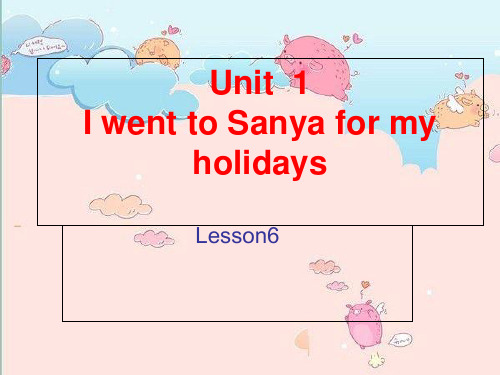
holidays
Lesson6
How did you learn English?
We learned English by doing things
We learned form each other.
do tasks
have an English party
A new dress! Thank you,Mum.
Micky jumps up. Do you know why?
•
9、有时候读书是一种巧妙地避开思考 的方法 。2021/8/52021/8/5T hursday, August 05, 2021
•
10、阅读一切好书如同和过去最杰出 的人谈 话。2021/8/52021/8/52021/8/58/5/2021 6:13:27 AM
• 6.How did you learn English? • 如何询问某人是怎样学习某种语言的 • How did......learn......? • We learned English by doing things. • 我们通过做事情学习英语的。 • 问句:How did +主语+learn+语言? • 答语:主语+learned+语言+by+动词ing形式+
•
11、越是没有本领的就越加自命不凡 。2021/8/52021/8/52021/8/5Aug-215-Aug-21
•
12、越是无能的人,越喜欢挑剔别人 的错儿 。2021/8/52021/8/52021/8/5T hursday, August 05, 2021
•
六年级英语下册 Unit 1 Lesson 6(1)教案 冀教版

冀教版六年级英语下册教案Unit 1 SportsLesson 6 Who won?一.Teaching Objectives and Demands:1.Student can understand read say and practice the dialogue of this lesson .2.Student can understand read say and practice the past tense.3.Student can understand read say and practice the past tense of these verbs:do---did, buy---bought, are---were, win---won, lose---lost.二.The Importance and The Difficult point:The importance: Practice the dialogue.The difficult point: Practice the past tense.三.Teaching Aids:some pictures, some vocabulary cards and one tape-recorder, a big picture for food 四.Allocation of time:one course五.Teaching steps:Step anizing the teaching1.Greetings2.Sing an English song.Step 2. RevisionReview past tense, continious—present tense and future—tensr verbs the Sshave mastered.Review the fiferent structure of different tense.Step 3.Key concepts:What did you do?1.Introduce:Here is a way to demonstrate the new phrase.Write “morning”“afternoon”and “evening”across the top of the BB.Ask for avolunteer,whisper to the volunteer to perform different activities undereach word,starting with “morning”.Whisper activities such as “playpingpong” “skate”and “wash” the dishes.Ask the class to guess theactions.Then lead the volunteer and the class through a dialogue such as: T:Now it is evening. What are you doing now?S:I am washing the dishes.T:Yes!Great!This morning, you played pingpong.What did you do this morning?S:I played pingpong.T: Great!What did you do this morning?What did you do.Say it please.S:What did you do?T:Great! What did you do?S:I skated.T:Very good!What are you doing now?S: I am washing the dishes.2.Student book :a.Review the story so far.LiMing and Jenny are learning about sports.In thelast lesson,they watched a basketball game.In this lesson, they come home.Whodo they tell about the basketball game?b.Note the past tense for win and lose in this lesson:won and lost.c.Play the audiotape as the Ss follow along their books.3.Practice: e word-card to show Ss how to substitute words in these threephrases: “What did you do?_____(ed)”“What are you doing?____ing”, andwhat are you going to do?I/We am/are going to _____.b.Divide the class into small groups.Ask each group to make up a dialogueabout coming home from somewhere and telling their parents where they wereand what they did.六.Students’ activity:1.Daily dialogue with each other.2.Retell the story so far.3.Word—cards game with the whole class.4.Imitition.5.Discuss the story in the student book.6.Group work to practice the dialogue.七.Blackboard:Lesson 6 Who won?lose--------------lostwin---------------wonyell---------------yelled。
【优质文档】(人教新版)六年级英语下册课件 Unit 1 Lesson 6(1

I was at home.
How was your holiday?
It was exciting.
Where were you during holiday?
I was in Shanghai.
How was your holiday?
March 14,1879 Germany
April 2,1805
Denmark
September 25, 1881
Shaoxin Zhejiang
October 25, 1900
Fuzhou Fujian
Kate: Yes, I was.
Lisa: Hello,Peter. Where were you last Sunday?
cinema
Bob:
I was at the cinema. How about you, Lisa? Were you at the bookshop last Sunday?
Were you at the bookshop last Sunday? Bob: Yes, I was.
Kate: Hello,Bob. Where were you last Sunday? bookstore
bookshop
Bob:
I was at the bookshop. How about you, kate? Were you at the shop last Sunday?
It was wonderful.
Where were you during holiday?
I was in Beijing.
How was your holiday?
人教新版小学六年级英语下册unit 1 how was your holiday 教案
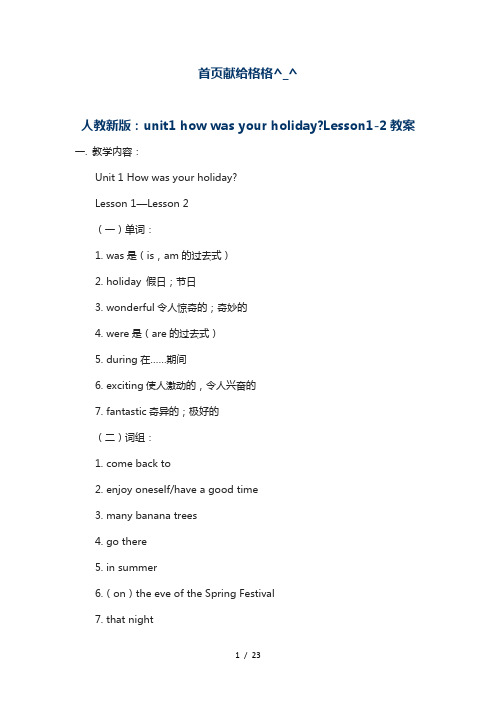
首页献给格格^_^人教新版:unit1 how was your holiday?Lesson1-2教案一. 教学内容:Unit 1 How was your holiday?Lesson 1—Lesson 2(一)单词:1. was是(is,am的过去式)2. holiday 假日;节日3. wonderful令人惊奇的;奇妙的4. were是(are的过去式)5. during在……期间6. exciting使人激动的,令人兴奋的7. fantastic奇异的;极好的(二)词组:1. come back to2. enjoy oneself/have a good time3. many banana trees4. go there5. in summer6.(on)the eve of the Spring Festival7. that night8. during your holiday9. at home10. in Shanghai(三)句型:1. How was your holiday ?It was wonderful.2. Where were you during your holiday?I was at home.(四)语音:ng二. 语法:一般过去时:一般过去时可以表示过去某一时间或某一段时间发生的动作或存在的状态,一般要和表示过去的时间状语连用。
A. 动词be的一般过去时的用法:(1)在一般过去时中,原来一般现在时中的be动词要改成was或were,即主语如果是I,he,she,it,以及相当于第三人称单数的名词,谓语动词一律用was;其他人称一律用were。
(2)和一般现在时一样,一般过去时中的动词be在构成疑问句时只要把was或were放到主语前,句末加问号即可。
构成否定句时只需在was或were 后面加not。
B. 其他动词一般过去式的构成及用法:在一般过去式中,动词通常用一般过去式来表示,动词一般过去式的变化及读音有以下规则:(1)一般情况下在动词词尾加-ed,词尾-ed在浊辅音和元音后面读[d],在清辅音后面读[t],在[t]和[d]的后面,词尾-ed一律读[id]。
六年级英语下册 unit1 How was your holiday Lesson(3)教案 人教

Unit 1 How was your holiday? Lesson 2Lesson Type : Practice lessonI. Teaching Aims and Demands1 Main words : exciting , wonderful ,fantastic , interesting , at home holiday .2 Main sentences : How was your holiday ? It was wonderful . Where was you during your holiday ? I was at home .3 Let’s interview.4 Let’s read and chant :5 The ability of Ss’ reading and writing .II Teaching Important and Difficult point1 Apply the sentences to the real situation .2 Make sentences with the words .3 Can speak out in right tone .III Teaching AidsPicture card , recorder , sticker .IV Teaching Methods1 Direct Teaching Method2 Listening and Speaking3 TPR happy Teaching MethodV Teaching Affection1 Be confident during studying English .2 To promote the Ss’ interest and cooperation .3 Develop the Ss’ innovation .VI Teaching ProceduresStep 1 Warming-up \ Revision (5’)(1) Free talkT : Who is on reporter duty today ?Step 2 Presentation (20’)(1) T : I went to visit Guilin of Kunming during my holiday ? It was wonderful ! Where were you during your holiday ? How was your holiday ?(2) Ss : ---(3) Make sentences with the words : exciting , wonderful , fantastic , interesting , am , is , was , are , were .(4) Listen to the tape and repeat .(5) Let’s interview in your group .Step 3 Practice (10’) Let’s chantStep 4 Assessment (5’) Write the words .VII The blackboard Design。
六年级下册英语课件-Unit 1 Lesson 6_人教精通(2014秋)

act in drama
learn from each other
Language points
• When did you go to school? • Where did you go yesterday? • What did you do last night?Leabharlann Language points
• Names • listen • write • chant • speak • read
名字 听 写 说唱 说 读
• work in pairs • 两人合作 • do role play • 进行角色扮演 • work in groups • 小组合作
Animals School is open again. The animals come back after their holidays.
A new dress! Thank you,Mum.
Micky jumps up. Do you know why?
其他
写出动词的过去式
work learn dance
worked learned danced
sing have teach
sang had taught
How did you learn English? 你们怎样学习英语的?
We learned English by doing things. 我们通过做事情学习英语的。
The teacher asks the students about their holidays.
Did you enjoy your holidays?
Hi, Rabbit. What did you do during
新人教新版英语六年级下册《unit1 how was your holiday》lesson 4教学设计(精品).doc
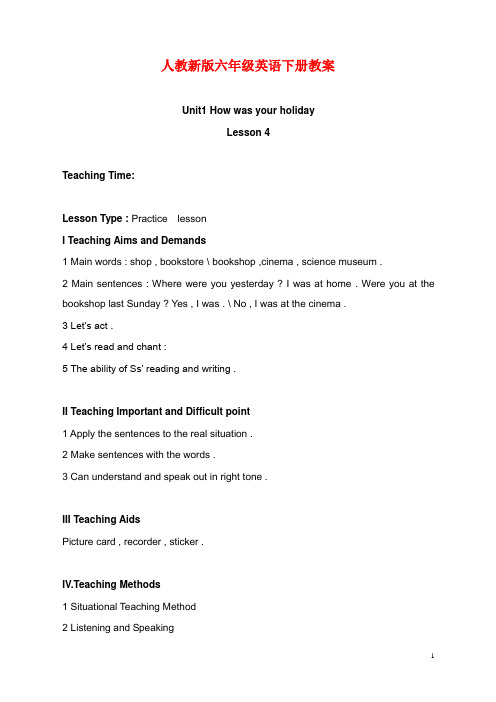
人教新版六年级英语下册教案Unit1 How was your holidayLesson 4Teaching Time:Lesson Type : Practice lessonI Teaching Aims and Demands1 Main words : shop , bookstore \ bookshop ,cinema , science museum .2 Main sentences : Where were you yesterday ? I was at home . Were you at the bookshop last Sunday ? Yes , I was . \ No , I was at the cinema .3 Let’s act .4 Let’s read and chant :5 The ability of Ss’ reading and writing .II Teaching Important and Difficult point1 Apply the sentences to the real situation .2 Make sentences with the words .3 Can understand and speak out in right tone .III Teaching AidsPicture card , recorder , sticker .IV.Teaching Methods1 Situational Teaching Method2 Listening and Speaking3 TPR happy Teaching MethodV Teaching Affection1 To promote the Ss’ confidence and interest .2 Learn to cooperate with others .3 Develop the Ss’ innovation .VI Teaching ProceduresStep 1 Warming-up (5’)(1) Free talking .\ Greeting .Step 2 Presentation (20’)(1) T : Hi ! What were you do last Sunday ? \ Where were you last Sunday ?(2) Ss : ---(3) T : Look at the picture Where was he \ she in last Sunday ? Ss : --- . How about you ? Were you at the bookshop last Sunday ? Ss : --- .(4) The Ss ask and answer each other like this .(5) Listen to the tape and repeat .Step 3 Practice (10’)(1) Make the sentences with the words .(2) Let’s act in you group .Step 4 Assessments (5’)(1) Let’s read and chant .(2) Write the main words and sentences .VII The Blackboard and DesignUnit 1 Lesson 4A :Where were you yesterday ?B : I was at home .A : Were you at the booksshop last Sunday ?B : Yes , I was .No, Iwasn’t . I was at the cinema .VIII Back Courting。
- 1、下载文档前请自行甄别文档内容的完整性,平台不提供额外的编辑、内容补充、找答案等附加服务。
- 2、"仅部分预览"的文档,不可在线预览部分如存在完整性等问题,可反馈申请退款(可完整预览的文档不适用该条件!)。
- 3、如文档侵犯您的权益,请联系客服反馈,我们会尽快为您处理(人工客服工作时间:9:00-18:30)。
人教新版六年级英语下册教案Unit 1 How was your holiday
Lesson 6
Teaching Time:
Lesson Type : Practice lesson
I Teaching Aims and Demands
1 Main words : born , date of berth , age , place of birth .
2 Main sentences : Where were you born ? When were you born ? I was born on January 1st ,1992 .
3 The ability of Ss’ reading and writing .
4 Let’s do a survey .
5 Let’s read and chant : wh
II Teaching Important and Difficult point
1 Understand and Speak out the words and sentences in right .
2 Apply the sentences to the real situation .
III Teaching Aids
Picture card , record , sticker .
IV Teaching Methods
1 Situational Teaching Method
2 Direct Teaching Method
3 TPR happy Teaching Method
V Teaching Affection
1 To promote the Ss’ interest and confidence .
3 To foster the Ss’ cooperation .
4 Develop the Ss’ imagination and innovation .
VI Teaching Procedures
Step 1 Warming-up \ Revision (5’)
Reporter on duty .
Step 2 Presentation (15’)
(1) T : Do you remember last lesson : Where was Yang Ming’s born and when was he born ? And , what about Li Yan ?
Ss :--- .Write out :
Name : Yang Ming
Age : Six
Date of birth : January 1 st , 1992 .
Place of birth : Hangzhou
Job :
------
(2) Teach the new words .
Listen and repeat .
Step 3 Practice (10’)
(1)Let’s do survey and write o ut in your group .
(2) Let’s read and chant .
Step 4 Assessment (10’)
(1) Read the words and sentences to your group leader .
(2) Write the main words and sentences .
VII The Blackboard Design
VIII Back Courting。
